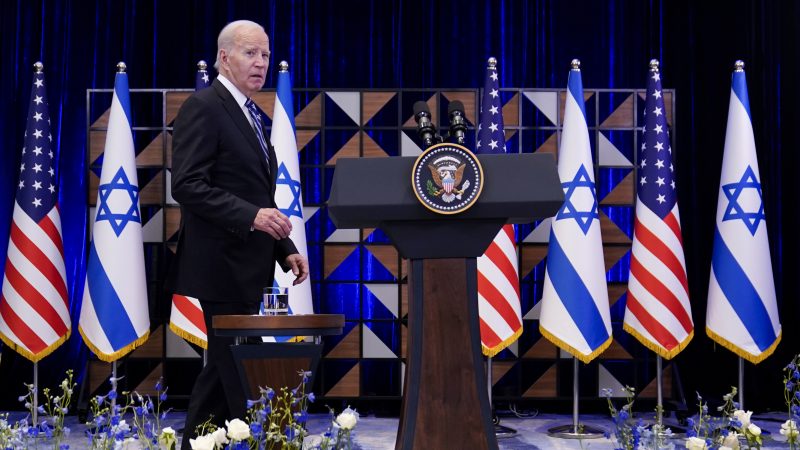
At a fundraiser in Boston last week, President Biden spoke passionately as he recounted the atrocities Hamas had carried out against Israelis when it attacked on Oct. 7.
“Reports of women raped — repeatedly raped — and their bodies being mutilated while still alive, of women’s corpses being desecrated and Hamas terrorists inflicting as much pain and suffering on women and girls as possible, and then murdering them,” Biden said.
The president has repeatedly voiced such empathy and sorrow for the suffering of Israelis, and the fears of Jews worldwide, in the aftermath of the Oct. 7 attacks, winning him deep appreciation among Israel’s supporters. But many Arab and Muslim Americans, as well as young voters and antiwar liberals, say the same compassion and conviction have often been missing from Biden’s rhetoric about the suffering of Palestinians in Gaza, even as the death toll there surges past 17,000, including thousands of children.
“The president, different from his graphic description of Hamas’ horrific attack on Israel and Israeli victims … has rarely talked about the Palestinian children torn to pieces, or the hundreds of thousands of people without water or food,” said Shibley Telhami, a Middle East scholar at the University of Maryland. “He talks about [Palestinians] as if they’re victims of an earthquake or natural disaster, without tying them to the actions of the Israeli government with his support and backing.”
White House officials strongly dispute this, noting that Biden has repeatedly called on Israel to avoid civilian casualties. The president told reporters on Oct. 25, for example, “Israel has to do everything in its power, as difficult as it is, to protect innocent civilians.” They also say Biden’s repeated calls for increased aid to Gaza are driven by a desire to alleviate the suffering of innocent Palestinians.
But many Muslim and Arab American leaders feel Biden’s emotional pitch and expressions of empathy are starkly different when he talks about Israelis and Palestinians, especially as the humanitarian situation in Gaza has deteriorated. About 80 percent of Gaza’s population has been displaced and a growing number lack basic necessities.
Some took particular offense at the president’s dismissal several weeks ago of the casualty numbers from the Gaza Ministry of Health, which is controlled by Hamas. Asked by a reporter about the growing number of deaths, the president shot back, “I have no notion that the Palestinians are telling the truth about how many people are killed.”
Yet the health ministry’s figures closely match the internal count of the U.S. government, according to U.S. officials who spoke on the condition of anonymity to discuss intelligence matters. In late October, when the ministry put the death toll at more than 15,000, U.S. officials provided the same figure to Congress, saying it matched the latest U.S. intelligence assessment. Many Arab and Muslim Americans felt Biden was being dismissive in brushing off what amounts to thousands of lost lives.
The next day, Biden apologized to a group of Muslim American leaders and promised to do better, according to people who spoke on the condition of anonymity to disclose details of a private meeting. A White House official said Biden’s comment stemmed from the fact that the U.S. government does not have anyone on the ground in Gaza to verify the figures and the reality that the health ministry’s numbers do not distinguish between combatants and noncombatants.
For some Arab and Muslim Americans, Biden’s seemingly matter-of-fact tone is especially frustrating coming from a figure known for his ability to relate to suffering. The president lost his own wife and baby daughter in a car crash in 1972, and his son Beau died of brain cancer in 2015, often enabling him to speak of grief with genuine empathy.
When he does speak of the suffering and death in Gaza, Biden has shown a reluctance to directly criticize Israel for it, increasingly creating a divergence with some of his staff. Several of Biden’s top officials have become more willing to suggest Israeli culpability, and speak evocatively of Palestinian grief, since it resumed its military campaign in Gaza by hitting the south with seemingly the same ferocity as it earlier struck the north.
In a recent trip to the Middle East, Vice President Harris declared that “too many innocent Palestinians have been killed,” adding, “Frankly, the scale of civilian suffering and the images and videos coming from Gaza are devastating.” Defense Secretary Lloyd Austin, speaking on Dec. 2 at the Reagan National Defense Forum, warned Israel that when it comes to civilians, “If you drive them into the arms of the enemy, you replace a tactical victory with a strategic defeat.”
Secretary of State Antony Blinken, during a recent visit to Tel Aviv, evoked images of Palestinian children being pulled from the rubble, saying, “When I look into their eyes through the TV screen, I see my own children.” Blinken also recently said there is a “gap” between Israel’s stated intent of protecting civilians and what’s actually happening in Gaza.
White House spokesman Andrew Bates said Biden “mourns for the innocent Palestinian civilians who have lost their lives in this conflict, underlining that one civilian casualty is far too many and every life lost is heartbreaking.”
Biden and his aides, Bates said, “have consistently pressed our Israeli counterparts to do everything possible to avoid civilian casualties.” U.S. officials say that has resulted in Israel scaling back the size of its ground force in Gaza and letting in significantly more humanitarian aid.
But officials have conceded that U.S. warnings to Israel about casualties in southern Gaza have not been heeded. And Biden’s team does not support placing conditions on U.S. aid to Israel or other punitive moves that could increase pressure on the Middle East ally.
White House officials note that in a Nov. 18 column in The Washington Post, Biden emotionally recounted Palestinian suffering.
Describing himself as “heartbroken” by the situation, Biden said, “Palestinian children are crying for lost parents. Parents are writing their child’s name on their hand or leg so they can be identified if the worst happens. Palestinian nurses and doctors are trying desperately to save every precious life they possibly can, with little to no resources. Every innocent Palestinian life lost is a tragedy that rips apart families and communities.”
Biden’s critics said he rarely if ever expresses such feelings in verbal or spontaneous comments.
He has not echoed his aides explicitly in saying that too many Palestinians have died, though he has decried what he says is Hamas’s use of Palestinian civilians as human shields.
In recent remarks on the release of Israeli hostages, Biden cited the increased aid arriving during a pause in the fighting. “Hundreds more trucks are getting in position as well, ready to enter Gaza over the coming days to support the innocent Palestinians who are suffering greatly because of this war that Hamas has unleashed,” Biden said. “Hamas doesn’t give a damn about them.”
Biden’s aides say he has an emotional attachment to Israel and a belief in its role as a vital haven for the Jewish people, a feeling that has developed over his decades in public life, including as chairman of the Senate Foreign Relations Committee. Biden has spoken myriad times about meeting Israeli Prime Minister Golda Meir in 1973 shortly after he was first elected to the Senate, a time when Israel was a new and left-leaning democracy in the Middle East fighting for its survival.
The Oct. 7 attacks affected Biden viscerally, aides say. In a speech three days later, Biden invoked a line he uses often to speak about grief. “It leaves a black hole in your chest when you lose family, feeling like you’re being sucked in — the anger, the pain, the sense of hopelessness,” he said.
Such language has won him acclaim from many Jewish leaders, even while more liberal Jewish activists decry Israel’s military onslaught and urge Biden to press for a cease-fire.
“President Biden’s support of Israel did not begin on Oct. 7 — it’s rooted in five decades of deep support for the U.S.-Israel relationship and an emotional attachment and commitment to Israel,” said Halie Soifer, chief executive of the Jewish Democratic Council of America.
After the Oct. 7 attacks, Biden told Jewish leaders that he has taken each of his grandchildren to the site of the Dachau concentration camp to teach them the lessons of the Holocaust. “He spoke in emotional and deeply empathetic terms,” Soifer said. “He understood how we felt in that moment, and he was there with us.”
Some White House officials say Biden sees Hamas’s explicit targeting of Israeli civilians as meaningfully different from Israel’s bombing campaign, whose stated aim is wiping out the militant group’s fighters.
But the Israeli strikes have resulted in far more civilian casualties, and some Biden officials emphasize that the goal of destroying Hamas does not justify the needless killing of innocent Palestinians. “As I told the prime minister, intent matters, but so does the result,” Blinken said in Israel on Nov. 30, referring to Israeli leader Benjamin Netanyahu. In her own remarks in the region, Harris, said, “As Israel defends itself, it matters how.”
Like Biden, Blinken is a staunch supporter of Israel whose views were forged during years of government service. But as the top U.S. diplomat, he has been at the receiving end of numerous warnings and pleas from Arab leaders and humanitarian groups seeking to limit the violence. He has also listened to diverging views within the State Department and met with authors of internal dissent memos calling for the United States to use its leverage with Israel to help end the conflict.
Many Arab and Muslim American voters say their current hurt and anger stems in part from the fact that they supported Biden in 202o in the belief that they were electing someone committed to human rights who could empathize with the deep grief they are now feeling. Some Palestinian Americans have lost dozens or more family members in Israeli airstrikes, and many Arab and Muslim Americans now say they will not back the president in next year’s election.
Imran Salha, imam of the Islamic Center of Detroit, said many Muslims and Arabs — including Arab and Palestinian Christians — feel betrayed. He recounted one Muslim activist who had been so energized by the president’s candidacy in 2020 that he had Biden’s name written on his birthday cake as he campaigned for him.
“He really thought he was investing in leadership that could carry some level of moral clarity,” Salha said. “All the people who made sure to campaign very strongly to get Biden the presidency — all of them feel betrayed.”
One Biden ally and former administration official, who spoke on the condition of anonymity to speak frankly about the president’s political views, said the president’s feelings for Israel have clouded his empathy for Palestinians, an assertion strongly disputed by the White House.
“Viscerally, Biden is famous for empathizing with a lot of people,” the person said. “He doesn’t have that same feel for the Palestinians.”















